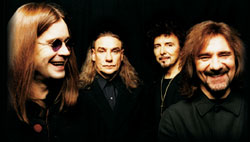| B i o g r a p h y |
 The Group was formed 1967, Birmingham, England. Mixing equal parts of bone-crushing volume, catatonic tempos, and
ominous pronouncements of gloom and doom delivered in Ozzy
Osbourne’s keening voice, Black Sabbath
was the heavy-metal king of the Seventies. Despised by rock critics and
ignored by radio programmers, the group sold over eight million albums
before Osbourne departed for a solo career in 1979. The four original members, schoolmates from a working-class district of
industrial Birmingham, first joined forces as Polka Tulk, a blues band.
They quickly changed their name to Earth, then, in 1969, to Black
Sabbath; the name came from the title of a song written by bassist
Geezer Butler, a fan of occult novelist Dennis Wheatley. The
quartet’s eponymously titled 1970 debut, recorded in two days,
went to #8 in England and #23 in the U.S. A single, "Paranoid,"
released in advance of the album of the same name, reached #4 in the
U.K. later that year, it was the group’s only Top Twenty hit. The single didn’t make the US, Top Forty, but the Paranoid LP,
issued in early 1971, eventually sold four million copies despite
virtually no airplay. Beginning in December 1970 Sabbath toured the
States relentlessly. The constant road work paid off, and by 1974 Black
Sabbath was considered peerless among heavy-metal acts, its first five
LPs all having sold at least a million copies apiece in America alone.
The Group was formed 1967, Birmingham, England. Mixing equal parts of bone-crushing volume, catatonic tempos, and
ominous pronouncements of gloom and doom delivered in Ozzy
Osbourne’s keening voice, Black Sabbath
was the heavy-metal king of the Seventies. Despised by rock critics and
ignored by radio programmers, the group sold over eight million albums
before Osbourne departed for a solo career in 1979. The four original members, schoolmates from a working-class district of
industrial Birmingham, first joined forces as Polka Tulk, a blues band.
They quickly changed their name to Earth, then, in 1969, to Black
Sabbath; the name came from the title of a song written by bassist
Geezer Butler, a fan of occult novelist Dennis Wheatley. The
quartet’s eponymously titled 1970 debut, recorded in two days,
went to #8 in England and #23 in the U.S. A single, "Paranoid,"
released in advance of the album of the same name, reached #4 in the
U.K. later that year, it was the group’s only Top Twenty hit. The single didn’t make the US, Top Forty, but the Paranoid LP,
issued in early 1971, eventually sold four million copies despite
virtually no airplay. Beginning in December 1970 Sabbath toured the
States relentlessly. The constant road work paid off, and by 1974 Black
Sabbath was considered peerless among heavy-metal acts, its first five
LPs all having sold at least a million copies apiece in America alone.
In spite of its name, the crosses erected onstage, and songs dealing with apocalypse, death, and destruction, the band members insisted their interest in the black arts was nothing more than innocuous curiosity (the sort that led Ozzy Osbourne to sit through eight showings of The Exorcist), and in time Black Sabbath’s princes-of-darkness image faded. Eventually, so did its record sales. Aside from a platinum best-of, We Sold Our Soul for Rock ‘n’ Roll (1976), not one of three LPs from 1975 to 1978 went gold. Osbourne, racked by drug use and excessive drinking, quit the band briefly in late 1977 (former Savoy Brown- Fleetwood Mac vocalist Dave Walker filled his shoes for some live dates). In January 1979 he left again, this time for good. Ronnie James Die, formerly of Ritchie Blackmore’s Rainbow, replaced Osbourne. Although Dio could belt with the best of them, Sabbath would never be the same. Its first album with Dio, Heaven and Hell (1980), went platinum, its second, Mob Rules (1981), gold. But thereafter, the group’s LPs sold fewer and fewer copies, as Black Sabbath went through one personnel change after another. III health forced Bill Ward out of the band in 1981; Carmine Appice’s brother Vinnie took his place. Friction between Iommi and Dio led the singer to quit angrily in 1982, he took P with him to start his own band, Die. Vocalists over the years have included Dave Donato; Deep Purple singer Ian Gillan; Glenn Hughes, another ex-member of Purple; Tony Martin; and Dio again.
By 1986’s Seventh Star, only Iommi remained from the original lineup. He had to wince when Geezer Butler teamed up with the phenomenally successful Osboume in 1988, though the bassist did return to the fold three years later. Despite bitterness expressed in the press between Osbourne and Iommi, the original foursome reunited in 1985 at the Live-Aid concert in Philadelphia, and again in 1992, at the end of what was supposedly Osbourne’s last tour. Throughout 1993 word had it that Osbourne, Iommi, Butler, and Ward would tour, but by year’s end Osbourne had backed out, allegedly over money. The indefatigable Tony Iommi went right back to work with Butler, rehiring vocalist Tony Martin and adding former Rainbow drummer Rob Rondinelli.
Line-Up:John Osbourne alias Ozzy (Vocals)
Anthony Iommi alias Tony (Guitar)
Terence Butler alias Geezer (Bass)
William Ward alias Bill (Drums)
Official Homepage: www.black-sabbath.com